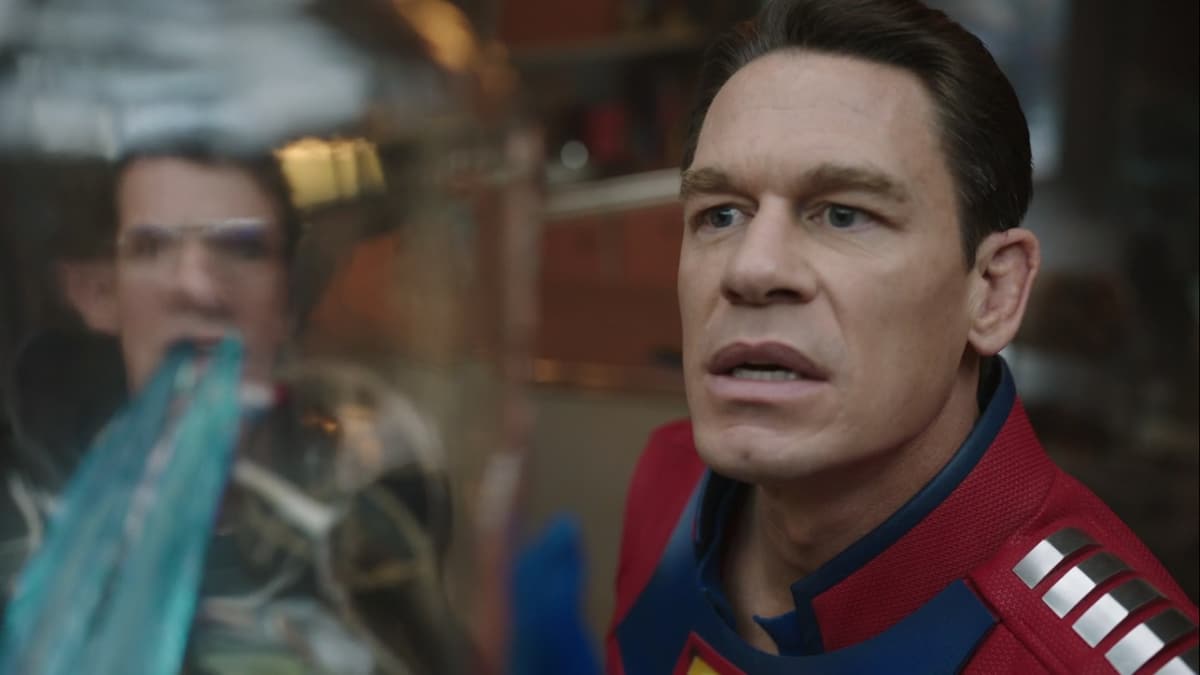This discussion and review of Peacemaker episode 6, “Murn After Reading,” on HBO Max contains some spoilers.
There’s an interesting scene in Blade Runner where Rick Deckard (Harrison Ford) administers a test to determine whether Racheal (Sean Young) is a human being or a replicant. Deckard asks Racheal to imagine her son. “He shows you his butterfly collection plus the killing jar,” Deckard explains, testing Rachael’s response. “I’d take him to the doctor,” Rachael replies. This is apparently something close to the human response; it takes Deckard quite a while to figure out that Rachael isn’t human.
The image of the butterfly collector recurs in popular culture, often associated with inhumanity and psychopathy. It is a central element of (and inspired many of the different covers to) John Fowles’ classic novel, The Collector. In The Collector, a lonely butterfly collector abducts a young woman. The novel has come to be associated with serial killers, inspiring the crimes of Christopher Wilder and Leonard Lake. Similarly, the death’s head moth is tied to the iconography of The Silence of the Lambs.
As such, it feels deliberate that Peacemaker (John Cena) has spent the past few episodes keeping his own butterfly in a jar. Of course, it is not a killing jar. Peacemaker has punctured air holes in the top and is even attentive to his captive’s needs. “You really go through this stuff, huh?” he muses of the strange goop that the creature consumes. “I’ll try to swipe more.” Naturally, Vigilante (Freddie Stroma) is confused that Peacemaker is keeping the creature alive, “Dude, you still have that thing?”
The imagery is evocative. It suggests something close to psychopathy, but not entirely across the line. Peacemaker returns time and again to the idea that its characters may be psychopaths. In “The Choad Less Traveled,” Harcourt (Jennifer Holland) complains that Vigilante is a psychopath. Murn (Chukwudi Iwuji) responds, “This is the four of us against a damn alien invasion. We need a psychopath.” However, the show asks whether Peacemaker himself is really a psychopath.

There are several points of comparison. Most of these are tied to the expression of emotion. Historically, sociopathy and psychopathy have been tied to a lack of empathy, with some studies suggesting that psychopaths have the ability to turn their empathy on and off at will. In Peacemaker, there is a strong emphasis on the importance of empathy, along with the ability to express and understand emotions. The show sets up several foils to underscore Peacemaker’s development.
Most obviously, there is Vigilante himself. When Peacemaker couldn’t shoot unarmed children in “Better Goff Dead,” Vigilante stepped up. It took the slightest prompt from Leota (Danielle Brooks) to convince Vigilante to try to murder Peacemaker’s father, Auggie (Robert Patrick), in “The Choad Less Traveled.” In “Murn After Reading,” Vigilante is eager to murder Sophie Song (Annie Chang) at the first opportunity. “How fucking cool was that?” asks Vigilante of a bloodbath in the woods.
Vigilante is a source of black comedy, but he also serves largely to make Peacemaker seem more human by comparison. Explaining how he tolerated Peacemaker’s constant verbal abuse for so long, he explains, “I didn’t care because I don’t have emotions like people do.” Naturally, this hampers his ability to communicate in a very literal manner; Peacemaker explains to Leota that Vigilante uses the “mermaid” emoji to encapsulate “happy, sad, and everything in-between.”
There is a slightly more ominous comparison to be made with Caspar Locke (Christopher Heyerdahl). Locke is the “sledgehammer” that Amanda Waller (Viola Davis) sends to clean up the team’s mess. Posing as the local police captain, Locke provides cover for the team. “There’s something wrong with that guy,” Song notes of her new superior. After watching Locke cold-bloodedly execute several of his own officers to aid Peacemaker’s escape, Peacemaker himself calls Locke a “psychopath.”

“Murn After Reading” makes a direct comparison between Locke and Peacemaker. At one point, a wounded female deputy begs for her life as Locke readies his weapon. This evokes Peacemaker’s confrontation with Ratcatcher 2 (Daniela Melchior) at the climax of The Suicide Squad. Ratcatcher begs for her life. Peacemaker is shaken. He hesitates. He doesn’t want to do it. This is the scene that inspired Gunn to write Peacemaker. In contrast, Locke mocks his victim’s pleading before killing her.
Unlike Vigilante, Locke understands the importance of faking emotional responses. The episode’s post-credits scene features Locke practicing his shocked reaction to “finding” the two bodies that he murdered. It is deliberately performative, seeming like something from a classic comedy outtake reel. Locke can’t keep a straight face as he pretends to be horrified by all this death. Pointedly, Locke isn’t the only character in “Murn After Reading” who has to fake emotional behavior.
During the police raid on Peacemaker’s trailer, the queen butterfly gets loose and takes over the body of Sophie Song. The alien parasite acts strangely in this new body, disconcerting Song’s long-time partner Larry Fitzgibbon (Lochlyn Munro). The creature tries to reassure Fitzgibbon with a smile, but it is not convincing. “People don’t realize that smiling is different on every single head,” she explains. “Every time you have to relearn it.” It is part of passing as human.
This theme of emotional expression is core to Peacemaker. Much has (deservedly) been made of the show’s remarkable opening credits sequence. However, one of the most striking creative choices is that the entire cast appears expressionless, adding a deliberately uncanny effect — juxtaposing the performative hair metal soundtrack with the blank and joyless faces showing “no emotion.” That dance sequence was always part of Gunn’s plan, going back to “the first draft of the first script.”

There is a direct comparison to be made between Song and Peacemaker. In “Best Friends, For Never,” Vigilante caught Peacemaker in a rare moment of emotional vulnerability. After insisting that he wasn’t going to turn to look at Vigilante in case the other hero would “throw jizz in (his) face” — another overt shoutout to Silence of the Lambs — Peacemaker explained that he was not crying but was doing “face muscle exercises.”
There’s an interesting inversion at play here. Both Locke and Song fake emotional responses to more convincingly pass as normal people, with Song explicitly noting that she needs to familiarize herself with these new face muscles. In contrast, Peacemaker struggles to conceal his emotions by using an excuse that he is “making (his) face more muscular.” The irony is that, unlike Locke or Song, Peacemaker actually has emotions. He has repressed them, but they are bubbling to the surface.
“I don’t want to kill anyone anymore,” Peacemaker tells Harcourt late in “Murn After Reading,” a rare moment of emotional honesty from the character. The butterfly is a metaphor of change and transformation, something that starts out ugly and unremarkable before becoming beautiful. There are even hints that it might be working. Before she is freed in the police raid, the alien queen makes a peace sign on the jar, suggesting the possibility of negotiation and peaceful resolution to the crisis.
Peacemaker mirrors its hero’s arc across the cast. Leota confesses to her wife Keeya (Elizabeth Ludlow) that she cannot be the operative that her mother Amanda Waller wants her to be: “I’m just not made for this shit.” Similarly, Murn recalls his own objections to the butterflies’ plan to “leech” off human life and take Earth for themselves. “I was the sole dissenter,” Murn confesses to Leota. “They said I was oversensitive.” He wasn’t psychopathic enough.

The alien inhabiting Murn understands that it has done terrible things. “You killed someone,” Leota states, realizing that the body she is talking to once belonged to someone else. “I needed to stop them, so I inhabited the worst person I could find,” Murn explains. Murn doesn’t downplay the horror of it. “Even he could have changed. I know that. I took that from him.” There’s something oddly humanist in all this. To live is to have the capacity and opportunity to change.
Gunn uses some evocative imagery. Early in “Murn After Reading,” Peacemaker is asked if he has an “origin story.” Thinking back to the death of his brother, Peter, Peacemaker replies, “Not in the traditional sense.” Peacemaker sees Peter’s death as the moment that he became the man that he is today. Gunn visually parallels Peter’s death with the possession of Song. Spittle flies from Peter’s mouth and blood from Song’s. Did Christopher Smith die with his brother? Or can he still change?
Locke shares his surname with the philosopher John Locke. Actor Christopher Heyerdahl is even made up to look a little bit like the philosopher. Locke wrote extensively about ideas of self and identity, proposing that every person was born as a “tabula rasa,” a blank slate that could be shaped through sensory experience. Peacemaker suggests that it’s never too late for somebody to transform themselves, even if they feel trapped in inescapable cycles. They just have to want to change.
For all Peacemaker’s dark comedy and bleak humor, there’s something surprisingly and earnestly heartwarming in that idea.






Published: Feb 3, 2022 01:00 pm